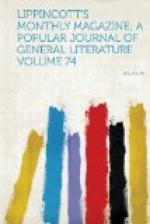A long mountaineer was before a dignified judge of the United States Court for selling liquor without a license. He had bought a gallon at a still,—as to the locality of which he professed profound ignorance,—carried it thirty miles, and peddled it out to his long-suffering and thirsty neighbors. Every native being a natural informer, the story was soon told: arrest followed, a march of fifty miles over the mountains, and a lengthy imprisonment before trial. Following the advice of his assigned counsel, he pleaded guilty. Being too poor to pay a fine, and having an unlimited family dependent upon their own exertions,—which comprises the sum of parental responsibility among the natives,—the judge released him on his own bail-bond, and told him to go home. He deliberately put on his hat, walked up to his honor, and said, “I say, jedge, I reckon you fellers ’ill give me ’nough money to ride hum an’ pay fer my grub, ’cause ’tain’t fair, noway. You fetched me clar down yere, footin’ it the hull way, an’ now you’re lettin’ me off an’ tellin’ me to foot it back. ’Tain’t fair, noway. You-uns oughter pay me fer it.” And he went off highly indignant at having his modest request refused.
There is much of the primitive not outgrown as yet by Charleston: it has put on a long-tailed coat over its round-about. The gossipy telephone is ahead of the street-cars; gas-works supply private consumers, while the citizens wade the unlighted streets by the glimmer of their own lanterns; innumerable cows contest the right of pedestrians to the board footways and what of pavement separates the mud-holes; an ice-manufactory supplies coolness to water peddled about in barrels; the officials outnumber the capacity of the jail; the ferry-facilities vary from an unstable leaky bateau to a dirty, open-decked dynamite steamboat, whose night-service is subject to the lung-capacity of the traveller hallooing for it, and the fares to necessities and circumstances; the fine brick improvements are flanked by frame tinder-boxes; the offal of the city has not a single relieving sewer: yet it is a beautiful, healthy place, and the chief city of the greatest mineral-district in the world.
Our travellers breakfasted on delicious mountain mutton and vegetables fresh from surrounding farms. Their host secured three men and a canoe to carry them up Elk River to Colonel Bangem’s camp, at the cost of one dollar a day and “grub,” or one dollar and a quarter a day if they found themselves, with the moderate charge of fifty cents a day for the canoe.
When the time arrived for starting, the Professor was missing. Bells were rung, servants were despatched to search the hotel for him, but he was not to be found. The Doctor grew impatient, but restrained himself until an uncoated countryman, who had just walked into town and was ready for a talk, told him that he “seed a feller, thet wuz a stranger in these parts, with a three-legged picter-gallery, chasin’ a water-cart a right smart ways back in the town, ez I come in.”




